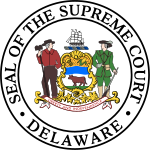Unocal v. Mesa Petroleum
| Unocal Corp. v. Mesa Petroleum Co. | |
|---|---|
 |
|
| Court | Supreme Court of Delaware |
| Full case name | Unocal Corporation, a Delaware corporation v. Mesa Petroleum Co., a Delaware corporation, Mesa Asset Co., a Delaware corporation, Mesa Eastern, Inc., a Delaware corporation, and Mesa Partners II, a Texas partnership |
| Decided | May 17, 1985 (oral decision) June 10, 1985 (written opinion) |
| Citation(s) | 493 A.2d 946 (Del. 1985) |
| Court membership | |
| Judge(s) sitting | John J. McNeilly, Jr., Andrew G.T. Moore II, Justices, and Taylor, Judge |
Unocal v. Mesa Petroleum Co., 493 A.2d 946 (Del. 1985) is a landmark decision of the Delaware Supreme Court on corporate defensive tactics against take-over bids.
Until the Unocal decision in 1985, the Delaware courts had applied the business judgment rule, when appropriate, to takeover defenses, mergers, and sales.
In Unocal, the Court held that a board of directors may only try to prevent a take-over where it can be shown that there was a threat to corporate policy and the defensive measure adopted was proportional and reasonable given the nature of the threat.
This requirement has become known as the Unocal test for board of directors (as later modified in Unitrin, Inc. v. American General Corp., which required the tactics to be "coercive" or "preclusive" before the court would step in).
Mesa Petroleum had made a front-end loaded two-tiered hostile bid for Unocal Corporation in which the front end was $54 in cash, and the back end of the deal was $54 in junk bonds. Because most shareholders would prefer to receive the cash instead of the bonds, shareholders were expected to tender their shares into the deal, even if they did not think $54 was a fair price. If a shareholder declined to tender, that shareholder risked being cashed-out for $54 in risky debt instruments instead of cash.
In response to the Mesa tender offer, Unocal made a self-tender at $72 for all but the Mesa shares. The Unocal board attempted to launch a self-tender offer to combat an unsolicited tender offer by Mesa Petroleum (Mesa). The self-tender offer would be triggered upon Mesa acquiring sixty-four million shares of Unocal, and would mean that Unocal itself would buy-back 49% of the outstanding shares of Unocal - but none of the shares to be bought-back could be shares held by Mesa.
The trial court found that this selective exchange offer was not legally permissible, and issued a preliminary injunction against the use of the self-tender offer defense.
The Delaware Supreme Court reversed the trial court.
It found that the Unocal's board of directors had reasonable grounds for believing that a danger to corporate policy or effectiveness existed and that the response was reasonable in relation to the threat posed. This reasonable relation analysis permitted an analysis of the price, nature, and timing of the offer as well as the impact on shareholders, creditors, customers, employees, and the community. Note that this permission to consider other constituencies besides the shareholders was curtailed in Revlon v. MacAndrews.
...
Wikipedia
